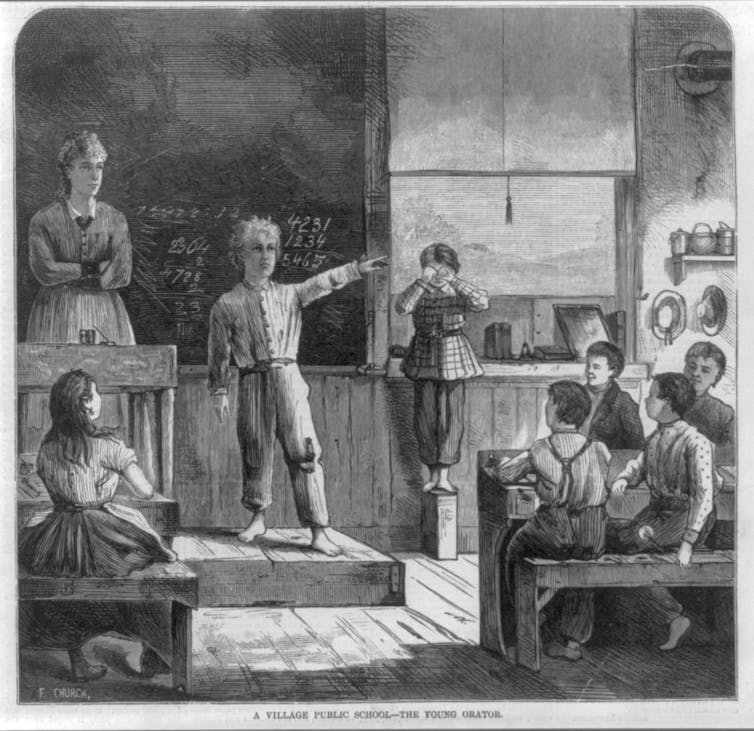
The founders of the United States were intentionally building a nation based on the ideals of the Enlightenment, a movement centered on individual happiness, knowledge and reason. This new approach to defining a country – rather than basing it on language, ethnicity or geographic proximity – meant the new United States would have to educate its citizenry with the ideas, skills and values necessary to build and grow their democracy.
As a result, the founders called for schools to be established and funded. George Washington, Thomas Jefferson, John Adams and others believed it was the responsibility of the government to provide that education. Jefferson believed that education would serve as the moral foundation of the nation and redress the effect of poverty because education would be available to all children.
Though public schools did not become widespread until the 19th century, the goal of educating informed citizens capable of inquiry and critical thinking was part of the democratic republic from the start. But nearly 250 years after the nation’s founding, its schools struggle to achieve that goal.

A fourth basic subject
Foundational American educational theorist John Dewey, who worked and wrote in the late 19th and early 20th centuries, promoted education that would help build and maintain a democracy made up of different groups of people. In his 1916 book “Democracy in Education,” he warned that focusing education only on the “three Rs: reading, ‘writing and 'rithmetic was not enough to educate a useful citizen.”
It is no accident that Dewey’s career in educational philosophy coincided with the rise of a new field of education, called social studies, aimed at cultivating good citizenship to build a stronger American society.
In 1916, the term was used by the National Education Association to “designate formal citizenship education and [place] squarely in the field all of those subjects that were believed to contribute to that end.”
That purpose remains today. According to the National Council of the Social Studies, the current goal of social studies education “is to help young people develop the ability to make informed and reasoned decisions for the public good as citizens of a culturally diverse, democratic society in an interdependent world.”
But since at least the 1980s, the nation’s public schools have consistently put social studies on the back burner. This process accelerated with the passage of the No Child Left Behind Act of 2001, which required schools to focus on the “three Rs,” to the exclusion of social studies.
A 2010 study demonstrated the relative importance of social studies when it reported that elementary school teachers spent 2.5 hours on social studies, 11.6 hours on Language Arts, and 5.3 hours on math per week.
A lower priority
As a scholar of social studies education, I have noticed that social studies is often a lower priority than reading, writing and math in many schools.
For instance, from 1993 to 2008, the time allotted to social studies instruction dropped by 56 minutes per week in third through fifth grade classes in the U.S. Over the same time, math, English and language arts instruction increased. This trend continued, with a 2014 study that documented an “an average of 2.52 hours of social studies instructional time per week.”
This reduction in social studies instruction has affected minority students more than others. Federal statistics show that since at least 1998, Black students have tended to score lower on tests of civics knowledge than white students.
One study described how that this civic education gap contributes to a civic participation gap, in which poorer people and those from nonwhite ethnic groups vote less. That study declared the gap “challenges the stability, legitimacy, and quality of our democratic republic.” Those comments echo those of Jefferson and Dewey, who believed that the purpose of schools was to prepare children to be citizens.
There was a need for civic education in their time – and the complexity of modern society and the increasingly obvious fragility of U.S. constitutional government indicate that social studies is more relevant and more vital now than ever before.
Kenneth Anthony receives funding from the Library of Congress Teaching with Primary Sources Program. He is a past president and member of the Mississippi Council for the Social Studies.
This article was originally published on The Conversation. Read the original article.







